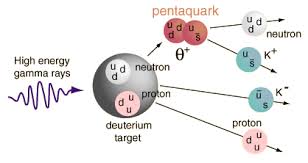Tag: physics
$3 Million for Mathematical Conjecture?
How can untested mathematical conjecture be awarded $3 million prize? That reflects badly on the Breakthrough Prize committee. https://physicsworld.com/a/breakthrough-prize-criticized-for…led-ideas/
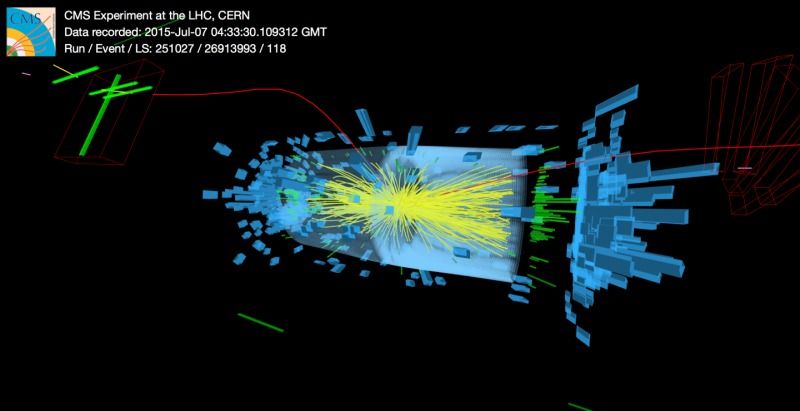
Exotic Pentaquark Particle Discovery & CERN’s Massive Data Center
July, 2015; as you know.. was the all systems go for the CERNs Large Hadron Collider (LHC). On a Saturday evening, proton collisions resumed at the LHC and the experiments began collecting data once again. With the observation of the Higgs already in our back pocket — It was time to turn up the dial and push the LHC into double digit (TeV) energy levels. From a personal standpoint, I didn’t blink an eye hearing that large amounts of Data was being collected at every turn. BUT, I was quite surprised to learn at the ‘Amount’ being collected and processed each day — About One Petabyte.
Approximately 600 million times per second, particles collide within the (LHC). The digitized summary is recorded as a “collision event”. Physicists must then sift through the 30 petabytes or so of data produced annually to determine if the collisions have thrown up any interesting physics. Needless to say — The Hunt is On!
The Data Center processes about one Petabyte of data every day — the equivalent of around 210,000 DVDs. The center hosts 11,000 servers with 100,000 processor cores. Some 6000 changes in the database are performed every second.
With experiments at CERN generating such colossal amounts of data. The Data Center stores it, and then sends it around the world for analysis. CERN simply does not have the computing or financial resources to crunch all of the data on site, so in 2002 it turned to grid computing to share the burden with computer centres around the world. The Worldwide LHC Computing Grid (WLCG) – a distributed computing infrastructure arranged in tiers – gives a community of over 8000 physicists near real-time access to LHC data. The Grid runs more than two million jobs per day. At peak rates, 10 gigabytes of data may be transferred from its servers every second.
By early 2013 CERN had increased the power capacity of the centre from 2.9 MW to 3.5 MW, allowing the installation of more computers. In parallel, improvements in energy-efficiency implemented in 2011 have led to an estimated energy saving of 4.5 GWh per year.
Image: CERN
PROCESSING THE DATA (processing info via CERN)> Subsequently hundreds of thousands of computers from around the world come into action: harnessed in a distributed computing service, they form the Worldwide LHC Computing Grid (WLCG), which provides the resources to store, distribute, and process the LHC data. WLCG combines the power of more than 170 collaborating centres in 36 countries around the world, which are linked to CERN. Every day WLCG processes more than 1.5 million ‘jobs’, corresponding to a single computer running for more than 600 years.

CERN DATA CENTER: The server farm in the 1450 m2 main room of the DC (pictured) forms Tier 0, the first point of contact between experimental data from the LHC and the Grid. As well as servers and data storage systems for Tier 0 and further physics analysis, the DC houses systems critical to the daily functioning of the laboratory. (Image: CERN)
The data flow from all four experiments for Run 2 is anticipated to be about 25 GB/s (gigabyte per second)
- ALICE: 4 GB/s (Pb-Pb running)
- ATLAS: 800 MB/s – 1 GB/s
- CMS: 600 MB/s
- LHCb: 750 MB/s
In July, the LHCb experiment reported observation of an entire new class of particles:
Exotic Pentaquark Particles (Image: CERN)
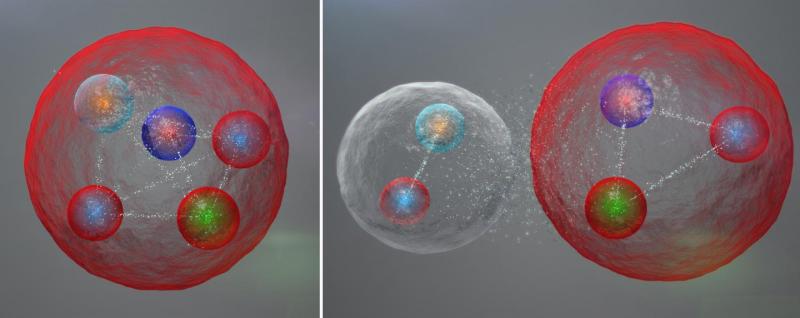
Possible layout of the quarks in a pentaquark particle. The five quarks might be tightly bound (left). The five quarks might be tightly bound. They might also be assembled into a meson (one quark and one anti quark) and a baryon (three quarks), weakly bound together.
The LHCb experiment at CERN’s LHC has reported the discovery of a class of particles known as pentaquarks. In short, “The pentaquark is not just any new particle,” said LHCb spokesperson Guy Wilkinson. “It represents a way to aggregate quarks, namely the fundamental constituents of ordinary protons and neutrons, in a pattern that has never been observed before in over 50 years of experimental searches. Studying its properties may allow us to understand better how ordinary matter, the protons and neutrons from which we’re all made, is constituted.”
Our understanding of the structure of matter was revolutionized in 1964 when American physicist Murray Gell-Mann proposed that a category of particles known as baryons, which includes protons and neutrons, are comprised of three fractionally charged objects called quarks, and that another category, mesons, are formed of quark-antiquark pairs. This quark model also allows the existence of other quark composite states, such as pentaquarks composed of four quarks and an antiquark.
Until now, however, no conclusive evidence for pentaquarks had been seen.
Earlier experiments that have searched for pentaquarks have proved inconclusive. The next step in the analysis will be to study how the quarks are bound together within the pentaquarks.
“The quarks could be tightly bound,” said LHCb physicist Liming Zhang of Tsinghua University, “or they could be loosely bound in a sort of meson-baryon molecule, in which the meson and baryon feel a residual strong force similar to the one binding protons and neutrons to form nuclei.” More studies will be needed to distinguish between these possibilities, and to see what else pentaquarks can teach us!
August 18th, 2015
CERN Experiment Confirms Matter-Antimatter CPT Symmetry
For Light Nuclei, Antinuclei (Image: CERN)

Days after scientists at CERN’s Baryon-Antibaryon Symmetry Experiment (BASE) measured the mass-to-charge ratio of a proton and its antimatter particle, the antiproton, the ALICE experiment at the European organization reported similar measurements for light nuclei and antinuclei.
The measurements, made with unprecedented precision, add to growing scientific data confirming that matter and antimatter are true mirror images.
Antimatter shares the same mass as its matter counterpart, but has opposite electric charge. The electron, for instance, has a positively charged antimatter equivalent called positron. Scientists believe that the Big Bang created equal quantities of matter and antimatter 13.8 billion years ago. However, for reasons yet unknown, matter prevailed, creating everything we see around us today — from the smallest microbe on Earth to the largest galaxy in the universe.
Last week, in a paper published in the journal Nature, researchers reported a significant step toward solving this long-standing mystery of the universe. According to the study, 13,000 measurements over a 35-day period show — with unparalleled precision – that protons and antiprotons have identical mass-to-charge ratios.
The experiment tested a central tenet of the Standard Model of particle physics, known as the Charge, Parity, and Time Reversal (CPT) symmetry. If CPT symmetry is true, a system remains unchanged if three fundamental properties — charge, parity, which refers to a 180-degree flip in spatial configuration, and time — are reversed.
The latest study takes the research over this symmetry further. The ALICE measurements show that CPT symmetry holds true for light nuclei such as deuterons — a hydrogen nucleus with an additional neutron — and antideuterons, as well as for helium-3 nuclei — two protons plus a neutron — and antihelium-3 nuclei. The experiment, which also analyzed the curvature of these particles’ tracks in ALICE detector’s magnetic field and their time of flight, improve on the existing measurements by a factor of up to 100.
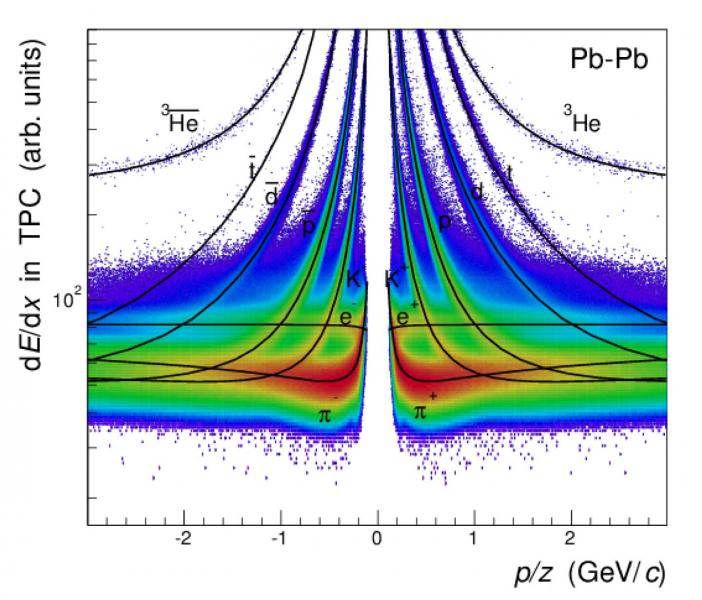
IN CLOSING..
A violation of CPT would not only hint at the existence of physics beyond the Standard Model — which isn’t complete yet — it would also help us understand why the universe, as we know it, is completely devoid of antimatter.
UNTIL THEN…
ORIGINAL ARTICLE POSTING via Michael Phillips LinkedIN Pulse @ http://goo.gl/ApdTL6
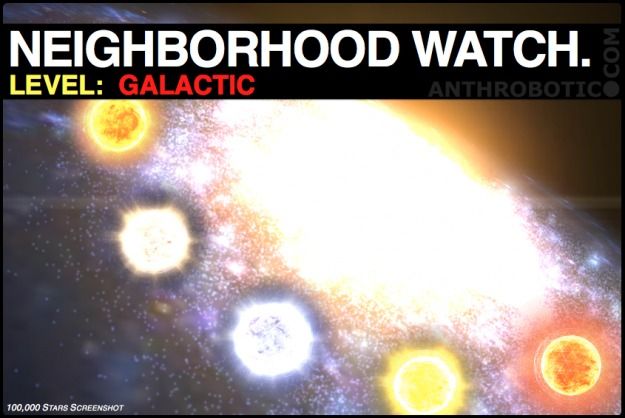
Google’s 100,000 Stars & the Paradigmatic Disruption of Large-Scale Innovation Revisited
The 100,000 Stars Google Chrome Galactic Visualization Experiment Thingy
So, Google has these things called Chrome Experiments, and they like, you know, do that. 100,000 Stars, their latest, simulates our immediate galactic zip code and provides detailed information on many of the massive nuclear fireballs nearby.

Zoom in & out of interactive galaxy, state, city, neighborhood, so to speak.
It’s humbling, beautiful, and awesome. Now, is 100, 000 Stars perfectly accurate and practical for anything other than having something pretty to look at and explore and educate and remind us of the enormity of our quaint little galaxy among the likely 170 billion others? Well, no — not really. But if you really feel the need to evaluate it that way, you are a unimaginative jerk and your life is without joy and awe and hope and wonder and you probably have irritable bowel syndrome. Deservedly.
The New Innovation Paradigm Kinda Revisited
Just about exactly one year ago technosnark cudgel Anthrobotic.com was rapping about the changing innovation paradigm in large-scale technological development. There’s chastisement for Neil deGrasse Tyson and others who, paraphrasically (totally a word), have declared that private companies won’t take big risks, won’t do bold stuff, won’t push the boundaries of scientific exploration because of bottom lines and restrictive boards and such. But new business entities like Google, SpaceX, Virgin Galactic, & Planetary Resources are kind of steadily proving this wrong.
Google in particular, a company whose U.S. ad revenue now eclipses all other ad-based business combined, does a load of search-unrelated, interesting little and not so little research. Their mad scientists have churned out innovative, if sometimes impractical projects like Wave, Lively, and Sketchup. There’s the mysterious Project X, rumored to be filled with robots and space elevators and probably endless lollipops as well. There’s Project Glass, the self-driving cars, and they have also just launched Ingress, a global augmented reality game.
In contemporary America, this is what cutting-edge, massively well-funded pure science is beginning to look like, and it’s commendable. So, in lieu of an national flag, would we be okay with a SpaceX visitor center on the moon? Come on, really — a flag is just a logo anyway!
Let’s hope Google keeps not being evil.
[VIA PC MAG]
[100,000 STARS ANNOUNCEMENT — CHROME BLOG]
(this post originally published at www.anthrobotic.com)
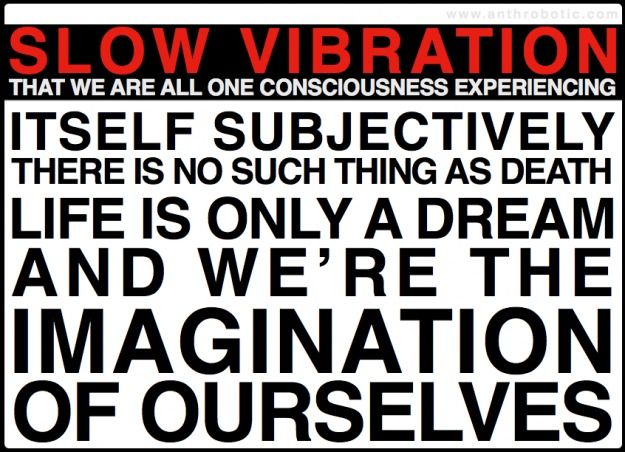
Today, a Young Man on Acid Realized that all Matter is Merely Energy Condensed to a…
…here’s Tom with the Weather.
That right there is comedian/philosopher Bill Hicks, sadly no longer with us. One imagines he would be pleased and completely unsurprised to learn that serious scientific minds are considering and actually finding support for the theory that our reality could be a kind of simulation. That means, for example, a string of daisy-chained IBM Super-Deep-Blue Gene Quantum Watson computers from 2042 could be running a History of the Universe program, and depending on your solipsistic preferences, either you are or we are the character(s).
It’s been in the news a lot of late, but — no way, right?
Because dude, I’m totally real
Despite being utterly unable to even begin thinking about how to consider what real even means, the everyday average rational person would probably assign this to the sovereign realm of unemployable philosophy majors or under the Whatever, Who Cares? or Oh, That’s Interesting I Gotta Go Now! categories. Okay fine, but on the other side of the intellectual coin, vis-à-vis recent technological advancement, of late it’s actually being seriously considered by serious people using big words they’ve learned at endless college whilst collecting letters after their names and doin’ research and writin’ and gettin’ association memberships and such.
So… why now?
Well, basically, it’s getting hard to ignore.
It’s not a new topic, it’s been hammered by philosophy and religion since like, thought happened. But now it’s getting some actual real science to stir things up. And it’s complicated, occasionally obtuse stuff — theories are spread out across various disciplines, and no one’s really keeping a decent flowchart.
So, what follows is an effort to encapsulate these ideas, and that’s daunting — it’s incredibly difficult to focus on writing when you’re wondering if you really have fingers or eyes. Along with links to some articles with links to some papers, what follows is Anthrobotic’s CliffsNotes on the intersection of physics, computer science, probability, and evidence for/against reality being real (and how that all brings us back to well, God).
You know, light fare.
First — Maybe we know how the universe works: Fantastically simplified, as our understanding deepens, it appears more and more the case that, in a manner of speaking, the universe sort of “computes” itself based on the principles of quantum mechanics. Right now, humanity’s fastest and sexiest supercomputers can simulate only extremely tiny fractions of the natural universe as we understand it (contrasted to the macro-scale inferential Bolshoi Simulation). But of course we all know the brute power of our computational technology is increasing dramatically like every few seconds, and even awesomer, we are learning how to build quantum computers, machines that calculate based on the underlying principles of existence in our universe — this could thrust the game into superdrive. So, given ever-accelerating computing power, and given than we can already simulate tiny fractions of the universe, you logically have to consider the possibility: If the universe works in a way we can exactly simulate, and we give it a shot, then relatively speaking what we make ceases to be a simulation, i.e., we’ve effectively created a new reality, a new universe (ummm… God?). So, the question is how do we know that we haven’t already done that? Or, otherwise stated: what if our eventual ability to create perfect reality simulations with computers is itself a simulation being created by a computer? Well, we can’t answer this — we can’t know. Unless…
[New Scientist’s Special Reality Issue]
[D-Wave’s Quantum Computer]
[Possible Large-scale Quantum Computing]
Second — Maybe we see it working: The universe seems to be metaphorically “pixelated.” This means that even though it’s a 50 billion trillion gajillion megapixel JPEG, if we juice the zooming-in and drill down farther and farther and farther, we’ll eventually see a bunch of discreet chunks of matter, or quantums, as the kids call them — these are the so-called pixels of the universe. Additionally, a team of lab coats at the University of Bonn think they might have a workable theory describing the underlying lattice, or existential re-bar in the foundation of observable reality (upon which the “pixels” would be arranged). All this implies, in a way, that the universe is both designed and finite (uh-oh, getting closer to the God issue). Even at ferociously complex levels, something finite can be measured and calculated and can, with sufficiently hardcore computers, be simulated very, very well. This guy Rich Terrile, a pretty serious NASA scientist, sites the pixelation thingy and poses a video game analogy: think of any first-person shooter — you cannot immerse your perspective into the entirety of the game, you can only interact with what is in your bubble of perception, and everywhere you go there is an underlying structure to the environment. Kinda sounds like, you know, life — right? So, what if the human brain is really just the greatest virtual reality engine ever conceived, and your character, your life, is merely a program wandering around a massively open game map, playing… well, you?
[Lattice Theory from the U of Bonn]
[NASA guy Rich Terrile at Vice]
[Kurzweil AI’s Technical Take on Terrile]
Thirdly — Turns out there’s a reasonable likelihood: While the above discussions on the physical properties of matter and our ability to one day copy & paste the universe are intriguing, it also turns out there’s a much simpler and straightforward issue to consider: there’s this annoyingly simplistic yet valid thought exercise posited by Swedish philosopher/economist/futurist Nick Bostrum, a dude way smarter that most humans. Basically he says we’ve got three options: 1. Civilizations destroy themselves before reaching a level of technological prowess necessary to simulate the universe; 2. Advanced civilizations couldn’t give two shits about simulating our primitive minds; or 3. Reality is a simulation. Sure, a decent probability, but sounds way oversimplified, right?
Well go read it. Doing so might ruin your day, JSYK.
[Summary of Bostrum’s Simulation Hypothesis]
Lastly — Data against is lacking: Any idea how much evidence or objective justification we have for the standard, accepted-without-question notion that reality is like, you know… real, or whatever? None. Zero. Of course the absence of evidence proves nothing, but given that we do have decent theories on how/why simulation theory is feasible, it follows that blithely accepting that reality is not a simulation is an intrinsically more radical position. Why would a thinking being think that? Just because they know it’s true? Believing 100% without question that you are a verifiably physical, corporeal, technology-wielding carbon-based organic primate is a massive leap of completely unjustified faith.
Oh, Jesus. So to speak.
If we really consider simulation theory, we must of course ask: who built the first one? And was it even an original? Is it really just turtles all the way down, Professor Hawking?
Okay, okay — that means it’s God time now
Now let’s see, what’s that other thing in human life that, based on a wild leap of faith, gets an equally monumental evidentiary pass? Well, proving or disproving the existence of god is effectively the same quandary posed by simulation theory, but with one caveat: we actually do have some decent scientific observations and theories and probabilities supporting simulation theory. That whole God phenomenon is pretty much hearsay, anecdotal at best. However, very interestingly, rather than negating it, simulation theory actually represents a kind of back-door validation of creationism. Here’s the simple logic:
If humans can simulate a universe, humans are it’s creator.
Accept the fact that linear time is a construct.
The process repeats infinitely.
We’ll build the next one.
The loop is closed.
God is us.
Heretical speculation on iteration
Even wonder why older polytheistic religions involved the gods just kinda setting guidelines for behavior, and they didn’t necessarily demand the love and complete & total devotion of humans? Maybe those universes were 1st-gen or beta products. You know, like it used to take a team of geeks to run the building-sized ENIAC, the first universe simulations required a whole host of creators who could make some general rules but just couldn’t manage every single little detail.
Now, the newer religions tend to be monotheistic, and god wants you to love him and only him and no one else and dedicate your life to him. But just make sure to follow his rules, and take comfort that your’re right and everyone else is completely hosed and going to hell. The modern versions of god, both omnipotent and omniscient, seem more like super-lonely cosmically powerful cat ladies who will delete your ass if you don’t behave yourself and love them in just the right way. So, the newer universes are probably run as a background app on the iPhone 26, and managed by… individuals. Perhaps individuals of questionable character.
The home game:
Latest title for the 2042 XBOX-Watson³ Quantum PlayStation Cube:*
Crappy 1993 graphic design simulation: 100% Effective!
- *Manufacturer assumes no responsibility for inherently emergent anomalies, useless
inventions by game characters, or evolutionary cul de sacs including but not limited to:
The duck-billed platypus, hippies, meat in a can, reality TV, the TSA,
mayonaise, Sony VAIO products, natto, fundamentalist religious idiots,
people who don’t like homos, singers under 21, hangovers, coffee made
from cat shit, passionfruit iced tea, and the pacific garbage patch.
And hey, if true, it’s not exactly bad news
All these ideas are merely hypotheses, and for most humans the practical or theoretical proof or disproof would probably result in the same indifferent shrug. For those of us who like to rub a few brain cells together from time to time, attempting to both to understand the fundamental nature of our reality/simulation, and guess at whether or not we too might someday be capable of simulating ourselves, well — these are some goddamn profound ideas.
So, no need for hand wringing — let’s get on with our character arc and/or real lives. While simulation theory definitely causes reflexive revulsion, “just a simulation” isn’t necessarily pejorative. Sure, if we take a look at the current state of our own computer simulations and A.I. constructs, it is rather insulting. So if we truly are living in a simulation, you gotta give it up to the creator(s), because it’s a goddamn amazing piece of technological achievement.
Addendum: if this still isn’t sinking in, the brilliant
Dinosaur Comics might do a better job explaining:

(This post originally published I think like two days
ago at technosnark hub www.anthrobotic.com.)

